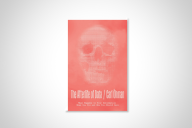You have /5 articles left.
Sign up for a free account or log in.
"I sound my barbaric yawp over the roofs of the world," Walt Whitman declares in Leaves of Grass. How he ended the line without an exclamation point always puzzled me, but maybe it was implicit. The poet sang "the body electric," and every line was meant to zap the reader into a higher state of awareness.
Whitman would have been pleased to see the new American history textbook called The American Yawp -- and not just for its allusive title. As a sometime school teacher and educational reformer, he wanted "free, ample and up-to-date textbooks, preferably by the best historians" (to quote one discussion of this aspect of the poet's life). Yawp's 30 chapters cover American history from the last ice age through the appearance of the millennial generation. It has plenty about the founders and the origins of the U.S., but avoids a triumphalist tone and includes material on inequality -- including economic inequality -- throughout. It was prepared through the collaborative efforts of scores of historians. And the creators have published it online, for free.
The beta version was released, with no fanfare at all, at the start of the current academic year. By the fall, a revision will be issued in e-book format, suitable for use in an undergraduate survey course -- again, for free. Walt would surely approve.
I contacted the editors -- Joseph Locke, an assistant professor of history at the University of Houston-Victoria, and Ben Wright, an assistant professor of history and political science at the Abraham Baldwin Agricultural College in south Georgia -- to find out more about The American Yawp. They collaborated in responding to my questions by e-mail. A transcript of the discussion follows.
Q: How did you go about writing (assembling?) your textbook? Did you collaborate via Listservs? Were there any face-to-face meetings?
A: Traditional textbooks usually begin with a single editor or a small team of editors searching for some unifying theme to tie together the many thematic strands of American history. Instead, we mirrored the way our profession already works. We believed that a narrative synthesis could emerge through the many innovations of our profession’s various subfields no less than through a preselected central theme. We therefore looked to a large and diverse yet loosely coordinated group of contributors to construct a narrative.
We began by mapping out potential contributions for all 30 chapters based on our experiences teaching the survey and in informal conversations with colleagues and potential chapter editors. We came up with things like “500 words on the election of 1860” and “300 words on the music and art of the Civil War.” We compiled these into lists.
Then, after tapping into the networks of scholars we knew, as well as scouring recent editions of major history journals, combing through lists of recent dissertations, browsing the rosters of university programs with traditional strengths in particular eras and soliciting contributors through social media and H-Net’s many history Listservs, we targeted scholars to write on these themes.
We had no trouble recruiting an adequate pool of qualified contributors. In fact, we ended up with over 300 historians writing for the project. This work was done almost exclusively online.
Q: Was it a matter of one person preparing a draft chapter and then other participants proposing changes?
A: Since a textbook should be more than a series of brief, disjointed topical entries, we began the work of synthesis. We recruited talented writers and scholars as chapter editors who went to work stitching submissions into coherent chapters. We then reviewed and edited drafts of all 30 chapters, particularly with an eye on ensuring greater narrative cohesion across the text.
During our beta year, we are soliciting feedback not only from our esteemed board of editorial advisers but from contributors and users through our parallel Comment Press platform. With that feedback in hand, we will publish a refined version of the text and begin a second phase that incorporates interactive digital content and further explores what a digital textbook is truly capable of.
Q: Are you aware of anyone teaching with the beta version? Have you had commitments from individuals or departments to use it during the next academic year?
A: Students are currently working with the text at a variety of institutions ranging from major state universities (such as the University of Georgia and the University of Florida) to various community colleges (such as Central New Mexico Community College and Bronx Community College) and everything in between (Rice University, Georgia State University, the University of Texas at Dallas and others). We don’t solicit formal commitments for use, but we’ve already heard from additional instructors and history departments hoping to adopt the text next fall. We are historians, not marketers, but we believe continued positive feedback and our formal launch in the fall will also encourage additional adoptions.
Q: In the culture wars, American history is one of the more harried battlegrounds. Did that factor into the textbook’s preparation in any way?
A: We believe history should be written by historians. We have no interest in the culture war, beyond mitigating the way that some have used it to wildly distort the past. Instead, we've trusted in our profession; our desire has been to reflect all the very best of contemporary scholarship.
On the other hand, we have been conscious about how to properly synthesize the American past. What gets included, and what doesn't? This is a difficult issue and we have enlisted the historical profession to help guide us. And we remain open to critical feedback.
Q: The talk page of a Wikipedia entry tends to become a forum for debate, informed and otherwise. Yawp is not in wiki format, of course, but will the comments component be moderated?
A: We've seen very little rancor in our Comment Press platform. Disagreements have mostly taken the form of highly specialized critiques. Historians are argumentative, but we've been pleased to see that all have followed the standards of professional decorum. We therefore haven't had any plans to moderate discussions. And, unlike a wiki, disruptive comments would not be able to filter into the text without editorial decisions.
Q: It seems as if The American Yawp could serve as a model for other textbooks. Is that the plan?
A: Our model is completely reproducible. We've accomplished this without institutions, grants or rarefied technological know-how. And we very much hope that others will follow our example. We already know, for example, that within our own profession there is quite a bit of interest for a similar project in world history.
Q: A commercially produced textbook can be financially rewarding for everybody involved in its creation, and it counts on an author's CV. These seem like powerful incentives for stasis. What would it take for your mode of textbook production to establish itself as viable over the long run?
A: Of course, a commercially produced textbook is not financially rewarding for everybody involved -- it is often quite financially punitive for our students. (The College Board, for instance, found that the typical student now spends $1,200 a year on textbooks and supplies.) And outside of a few textbooks written by a few academics for a few major presses, financial rewards can be extremely limited for textbook producers.
Still, the reputational economics of academia do matter. Professional consideration of projects such as this will certainly shift as academia continues to adjust to the digital age, but we also did not embark upon the project for economic or professional gain. This has been and will continue to be a labor of love. We entered the historical profession because we believe there is a moral imperative to study the American past and to share that knowledge with students and with the public. The rising costs of higher education makes that difficult. Academics recognize this, and we believe that's why over 300 academic historians were so willing to participate in this project.
We believe our model is viable in the long term. This is not a start-up having to satisfy investors or foundation boards. This is simply a collective of historians who have come together to share the knowledge of our profession. That doesn't mean certain developments couldn't further secure the long-term viability of projects such as this, of course. For instance, we have been looking into possible partnerships with innovative university presses to help satisfy the very reputational implications you cited.








